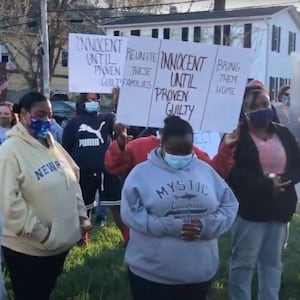A Rhode Island judge is allowing three young men to return home in a rape case that has divided the small town of South Kingstown, saying their continued pre-trial detention was “neither justified nor justifiable.”
The case centers on the events of March 1 and 2, where the three men and one juvenile, who was released on bail earlier this month, met up with a former classmate for a night of drinking. The 19-year-old former classmate claims she quickly blacked out and does not remember the sexual conduct that followed. Lawyers for the accused say she was a consenting participant in the acts, even if she cannot remember them.
The case has been a fracture point because of the racial dynamics at play: The victim is white, and all four defendants are Black. Community members have protested the state’s attempt to hold the three men without bail, claiming it is evidence of a racially biased justice system. Advocates for the woman, meanwhile, claim she is being victim-blamed by the men’s attorneys and unsupported by the community at large.
ADVERTISEMENT
In a previous bail hearing, the victim said she was willing to submit herself to hours of testimony and invasive personal questioning by both the prosecution and the defense in hopes of having the alleged assailants detained until trial.
“I want justice for myself and I want these boys to be held without bail,” she said, according to the Providence Journal. “The only way I can stand up for myself is to testify.”
On Friday, after 10 days of bail hearings spread out over more than a month, Rhode Island Superior Court Justice Melanie Wilk Thunberg denied her request.
“In the court’s estimation there is insufficient credible and reliable evidence... to support the state’s request,” Thunberg said. “The continued pretrial detain of these teenagers is neither justified nor justifiable.”
The young woman testified previously that she and the three men started drinking Hennessy on the night of March 1 and does not remember much of the evening after that. She claims she came to discover she was naked and being filmed, and that the fourth defendant, the juvenile, had joined them. She said she later discovered bruises on her body and could not remember how she acquired them. She only learned the full events of that night, she said, after seeing the videos the defendants took. “I was taken advantage of while incoherently drunk,” she testified, according to the Journal.
The court reviewed several of these videos during bail hearings, but Thunberg said Friday that they could not serve to “ratify or even bolster” the woman’s claims of being incapacitated. Instead, the judge said, the videos show several “voluntary movements” by the complainant and did not depict her in an unconscious or sleeping state. She added that the state would need to prove that the defendants knew of, or had cause to know of, the complainant’s “enfeebled” state.
Thunberg noted that the plaintiff testified that she could not remember the events of the night in question with any certainty, though—crucially, the judge said—she did retain some memories. And she appeared to sympathize with the suggestion by the defendants’ attorneys that she could have verbally consented to the acts without remembering them.
“Individuals in the throes of an alcoholic blackout … can and do engage in behavior and make utterances of which they later have no memory,” she said, citing the example to a drunk driver who is horrified to learn of his behavior after the fact.
Thunberg released the men—Montrell Wilson, 19, and Jah-Qwin Sekator and Trent Scuncio, 18—on their own recognizance, saying that they did not pose a flight risk or a risk to the safety of the community. She imposed an 8 p.m. curfew, mandatory substance abuse counseling, and a no-contact order with the complainant.
A spokesperson for the attorney general's office said they respected the judge's decision but remained ready to prosecute the case, which will first need to be brought to a grand jury for indictment. Lawyers for the defendants and the complainant declined to comment.
While some community members have expressed concern for the young woman and the invasive nature of the bail hearings, others members have rallied around the defendants. A group calling itself South Kingstown Care & Justice hosted a vigil in support of the defendants this month, arguing that they should be allowed to return to their families and classrooms while the state considers whether to proceed to trial. It is currently raising money for their legal fees.
Marcus Robinson, an organizer with the group who is related to the defendants, called the decision “a step toward justice.” But he said that the justice system was still weighted against defendants of color, pointing to the case of Ian Morgan—a white 18-year-old who was charged with third-degree sexual assault of a minor last month and released on his own recognizance that same day.
“Those cases are reserved for the privileged, but we are not the privileged,” he said. “We’re the minorities, and we’ll always be seen as guilty until proven innocent.”
“It feels good to have them home,” he said of the defendants. “But at the same time, there’s still a long way to go.”







